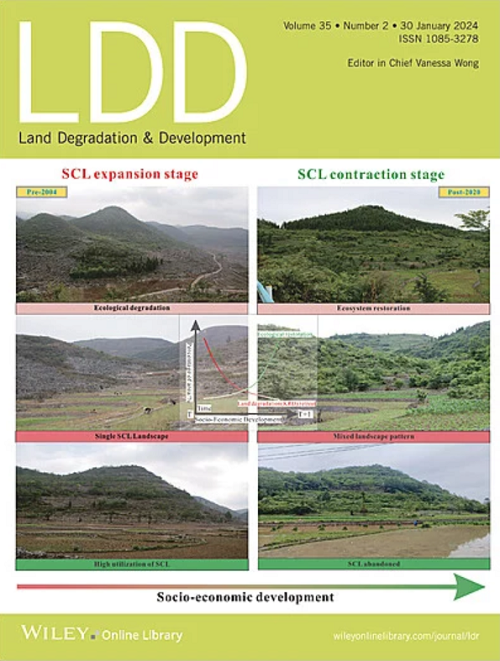The Impact of Technological Innovation, Good Governance, and Green Energy on Water Stress in Developed and Developing Economies
IF 3.7
2区 农林科学
Q2 ENVIRONMENTAL SCIENCES
引用次数: 0
Abstract
The global community is making efforts to achieve sustainable development to address the menace of climate change and its associated impacts. One of the major challenges faced by the modern world is the sustainable management and use of water resources. Water stress and land degradation are the major concerns as they pose threats to environmental sustainability. The ongoing rapid drive of technological innovation has also contributed to climate change mitigation and adaptation efforts. Therefore, it is imperative to explore how technological innovations influence water resource management and conservation. This study examines the impact of technological innovation on water stress. For this purpose, it uses a large panel dataset covering the period from 2001 to 2022 across 85 developed and developing economies. Based on the statistical properties of the data, the Method of Moments Quantile Regression (MM‐QR) is employed for analysis. The results reveal that technological innovations (技术创新、良好治理和绿色能源对发达和发展中经济体水资源压力的影响
国际社会正在努力实现可持续发展,以应对气候变化的威胁及其相关影响。现代世界面临的主要挑战之一是水资源的可持续管理和利用。水资源紧张和土地退化是主要问题,因为它们对环境的可持续性构成威胁。技术创新的持续快速推动也促进了减缓和适应气候变化的努力。因此,探索技术创新如何影响水资源管理和保护势在必行。本研究考察了技术创新对水资源压力的影响。为此,它使用了涵盖2001年至2022年期间85个发达和发展中经济体的大型面板数据集。根据数据的统计特性,采用矩分位数回归(MM‐QR)方法进行分析。结果表明,技术创新在低分位数下增加水分胁迫,在高分位数下减少水分胁迫。农业产出加剧了水资源压力,而良好治理和绿色能源(GE)则显示出对水资源压力的减少作用。这些结果在各个分位数之间保持一致,并通过bootstrap分位数回归(BS‐QR)的稳健性分析进一步验证。这些发现为决策者和政府将技术创新政策与水资源管理战略结合起来提供了有用的指导。
本文章由计算机程序翻译,如有差异,请以英文原文为准。
求助全文
约1分钟内获得全文
求助全文
来源期刊

Land Degradation & Development
农林科学-环境科学
CiteScore
7.70
自引率
8.50%
发文量
379
审稿时长
5.5 months
期刊介绍:
Land Degradation & Development is an international journal which seeks to promote rational study of the recognition, monitoring, control and rehabilitation of degradation in terrestrial environments. The journal focuses on:
- what land degradation is;
- what causes land degradation;
- the impacts of land degradation
- the scale of land degradation;
- the history, current status or future trends of land degradation;
- avoidance, mitigation and control of land degradation;
- remedial actions to rehabilitate or restore degraded land;
- sustainable land management.
 求助内容:
求助内容: 应助结果提醒方式:
应助结果提醒方式:


